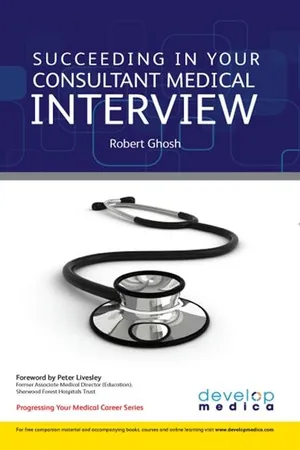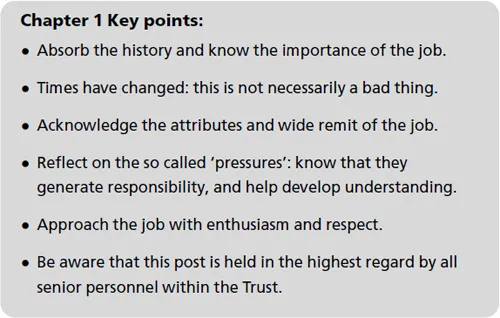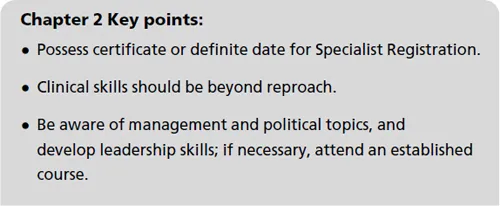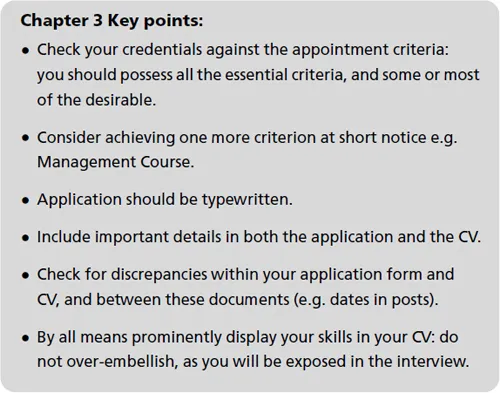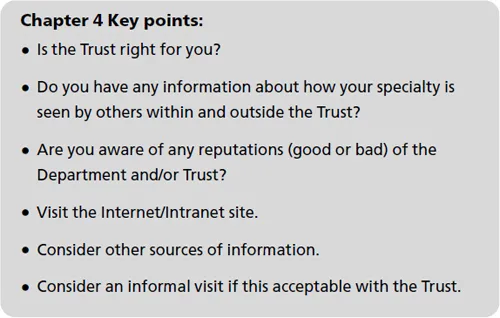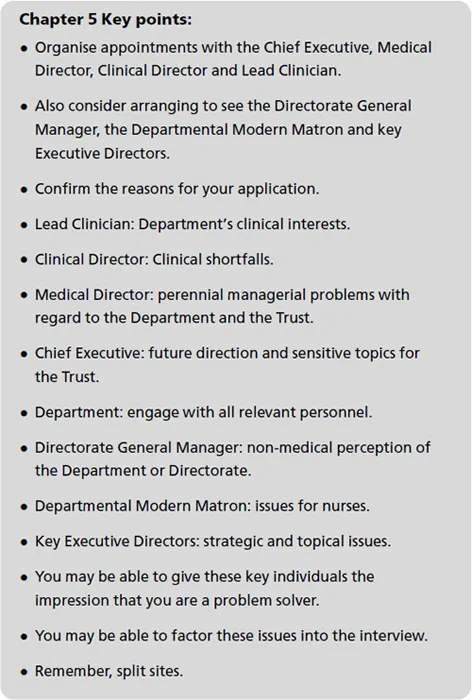![]()
Chapter 1 The context and philosophy of the Consultant Interview
Who or what is a Medical Consultant? The On-Line Medical dictionary refers to Medical Consultants as ‘Individuals referred to for expert or professional advice or services’. Through the decades, definitions and contexts have changed. The role and duties of Consultants now encompass not only the authoritative and advisory aspect of clinical care, but also increasingly much of the day to day clinical care previously provided by junior doctors. In addition, the management duties previously delegated to other personnel have now come within their remit.
Some individuals may hark back to decades gone by, when the visiting Consultant would sweep into the gravel drive of a private hospital, be greeted by the Matron and taken into her room for tea, prior to conducting a ward round and thereby providing an opinion on the patients in the ward. More recently, salaried NHS Consultants continued to possess attractive work lifestyles; academic activities could easily be provided, job plans were often notional and very flexible, and clinical practice could be adapted to personal whims without financial or managerial recourse.
Most would agree that, in the face of social and NHS modernisation, the job description and work/life balance of the Medical Consultant continue to be very attractive and worth pursuing. Clinical activities continue to be a heady mix of applied science, hands-on intervention, social interaction with patients and colleagues, rapid action, cerebration, academia, camaraderie and authority. The pressures of Government and Trust targets, the need for more availability and concurrent requirement for management skills should all help create a more rounded approach to problem solving, and thereby create better doctors, and indeed better clinicians.
One should approach the commencement of Consultant duties, and therefore the Consultant Interview with excitement and relish. Unmitigated cynicism is a bad starting point, and should perhaps preclude application. This post should be seen as the pinnacle of your career.
There is no doubt that the value and relevance of the Consultant post is given immense respect by all those conducting the interview, and also by other senior personnel in the Trust to which the application is made. This respect, together with the obvious qualities of the job, should prompt the prospective interviewee to make meticulous preparations, and treat the application and interview process with due consideration.
![]()
Chapter 2 Preparation prior to Application. Do you feel ready?
Clearly the paperwork (namely the Deanery approval or other pathways to subsequent Specialist Registration, together with the Certificate or definite date for Specialist Registration) must be available at the time of the interview or within the acceptable time frame after the interview. However above all, you the candidate must ‘feel ready’.
Your clinical skills should be exemplary, to the extent that you will have repeatedly provided a high quality clinical service without hands on supervision. This characteristic should be assumed as the norm, and will therefore be unlikely to separate the excellent candidates from the good ones in future interviews. The possession of sub-specialty skills may well impact, though they need to be relevant to the needs of the advertising Trust.
Most Consultants agree that it is non clinical skills that separate good from average colleagues. Knowledge of up to date management and political topics is essential. For example, a sound knowledge of the NHS structure and relationships with Acute Trusts, an understanding of the makeup and responsibilities of the Trust Board, and an awareness of recent political issues and proposals will provide a basic framework within which to apply leadership skills. Subsequent chapters in this book will identify topics which you should be aware of, and which are commonly asked in interviews. Leadership qualities are needed daily and in particular at times of stress (to deal with angry colleagues, frustrated patients, resource shortcomings and so on). There is a fine line between authority and arrogance. There are several high quality ‘Management courses’; attendance of one of these will usually be mandatory prior to, or just after appointment.
Often, urgent or emergency advice will be sought from Consultants with regard to ethical dilemmas, rather than pure clinical challenges. One should be aware of current opinion. Seeking advice from a colleague is often a better option than procrastination. There is an increasing number of Ethics and Philosophy courses relevant to clinical medicine.
Your career up to this point should have equipped you with significant skills in multitasking and prioritization in the clinical setting. As a Consultant, it is likely that these time management skills will more often be applied to management and other administrative duties. Successful audit, research and administrative activities as a trainee while in the midst of busy jobs should give a good impression.
If you genuinely think that you have ticked these boxes and you ‘feel ready’, it is time to give the advertisement some serious consideration.
![]()
Chapter 3 Check your credentials and apply
Appointment criteria (‘essential’ and ‘desirable’) may be included in the job advertisement, and will certainly be prominently displayed in the job description. Possession of all the essential (and at least some of the desirable) criteria on first reading of the job description is an essential starting point. If there is time to acquire an extra criterion prior to application, this is strongly recommended. For example, it is not uncommon for candidates to enroll and attend a worthwhile management course at very short notice. Sadly, many applicants are immediately rejected at the time of application as a result of not meeting the minimal requirements. This reflects badly on the applicant, who clearly has not understood or read the job description, and wastes the valuable time of those involved with shortlisting. A needless rejection will dent morale.
Almost all application forms will be available electronically; the applicant should give time and respect by typing the submission.
The details in the application and Curriculum Vitae should tally. Neither should contain any discrepancies of fact. Common examples include: incongruities of dates and chronology with regard to lists of previous posts; management, research and audit items included in the application though not the CV (or vice versa). Be prepared to be asked about date gaps, particularly if you have not clarified this in your CV. These gaps in years gone by would universally be seen as a negative characteristic. Fortunately, philosophies have changed and it becomes the responsibility of the candidate to identify character-building properties within these periods of time.
There is a fine line between heavily embellishing your CV and frankly lying. Judicious enhancement of facts (usually skills and experiences, particularly in the subjects of teaching, audit and research) is ethical; it is essential however, that this will sit comfortably in your own mind. Be prepared for meticulous dissection during the interview.
![]()
Chapter 4 Research the Trust to which you are applying before shortlisting
You will need to ensure that the Trust to which you are applying meets your requirements. Even if you have worked there in the past, there may have been recent changes to affect your working practice. It is important to note how your specialty or specialties are viewed by your potential colleagues, other medical personnel, non-medical staff, managers, the Trust Board, patients and the local Primary Care Trust. Do the personnel in the Department, Directorate and Trust have a reputation (good or bad) for anything in particular?
Much of this information may not be attainable without the time and diligence required from a formal post-shortlisting visit (see Chapter 5). However, informal opinions from junior doctors or other recent employees may be available to you.
All acute Trusts should have established Internet/Intranet sites. Considerable time and effort should be invested in researching the latter. Indeed the quality of the site itself may give you an impression of the quality (or lack) of information and visible priorities of the Trust. Take particular time to investigate the prominence and available information of your relevant Department and Specialty.
Other sources of important information include: the primary care trust website; the Strategic Health Authority website; the Chief Medical Officer’s Annual Report (there may be a section in that report which touches upon an issue, or clinical theme, which relates to the post).
If the information gathered so far is satisfactory, you may wish to consider visiting the Trust prior to shortlisting. It would be prudent to telephone or correspond with the Lead Clinician of the Department to establish whether this is acceptable. The aim of this brief visit is simply to absorb the atmosphere or ‘flavour’ of the hospital(s) and department(s), establish the nature of their location and facilities and confirm that you should proceed with your application; arranging formal appointments at this stage is not recommended.
![]()
Chapter 5 Preparation after shortlisting: the formal visit
Hopefully, selection for interview will instil pride and excitement. Preparations should be made for a formal visit to the Trust, including all its hospital sites. It is true to say that anybody who does not visit the Trust/Department prior to their interview is seriously reducing their chances of success. Organise appointments with the Chief Executive, Medical Director, Clinical Director and Lead Clinician. If you have time, also arrange to see the Directorate General Manager, the Departmental (Modern) Matron and key Executive Directors.
The aim of the visit should be to confirm to some key individuals your reasoning for applying to the Trust, and also to convey to them that you have an interest in the strategic development and anxieties of Trusts. It is useful for key Trust individuals to know, even before the interview, that you take an interest in ‘strategy’, and that you would like to play a key role in ‘development’ and problem-solving, if appointed. You may be in a position to factor these issues into the interview.
During the visit, confirm the qualities and features of the Trust which prompted your application. The research described in Chapter 4 will have equipped you for this. It might also be helpful to find out the current research or special interests of relevant panel members, especially if the post is likely to bring you into professional contact with them.
When questions are invited, it would be prudent to enquire from the Lead Clinician about the department’s subspecialty interests. There may be aspects that you were not aware of that are applicable to your skills and expertise. Questions pertaining to clinical shortfalls may be also be directed to the Lead Clinician, though a different perspective to the same question may be provided by the Clinical Director. The Medical Director may have an opinion on perennial managerial problems with regard to the Department and the Trust. The Chief Executive is best placed to discuss the future direction and sensitive topics for the Trust.
When visiting the Department, take time to engage with all the relevant personnel. This may include nursing staff, physiotherapists, technicians and ward clerks.
If you have made time to visit to the Directorate (Operational or ‘General’) Manager, you may find that (s)he has a unique non-medical perception on the running of the Department or Directorate. This may be important to you, and if it is you may wish to comment during the interview. In addition, the Departmental Modern Matron will be able to give you valuable insight into the issues facing your future nursing colleagues.
It may be relevant to visit key Executive Directors (other than the Chief Executive and Medical Director, who you will have already seen), who will have important opinions on strategic and topical issues. Their roles will include: Corporate Development; Planning; Service Development; Finance; Information; Nursing; Quality; Human Resources; Environment.
In posts which involve split sites one should endeavour to visit all key personnel from all sites. If the sites are within the same Trust, it is likely that the extra visit will involve a satellite department. If the post encompasses more than one Trust, all the appointments mentioned above need to be replicated.
![]()
Chapter 6 Portfolio preparation, Interview Practice and Dress Code
Portfolio preparation
Most candidates come to the interview equipped with their relevant logbook, if one exists. Most Royal Colleges, Deaneries or Learned Societies have templates or recommended formats available for downloading, and it is essential that this format is preserved, even if it is modified by individuals. Modification and expansion of the logbook to create a comprehensive portfolio is a novel idea, and in my opinion an excellent one. This is best done electronically using spreadsheets, which may be printed out for perusal at the interview. Items dedicated per sheet (in addition to the logbook) may include experiences with: complaints; risk; business cases; difficult clinical situations; situations leading to a change in practice; ethical dilemmas encountered; situations requiring leadership skills; situations requiring management skills; attendance or response to external visits from bodies such as the Healthcare Commission. If questions on these matters are asked during the interview, an articulate resp...
